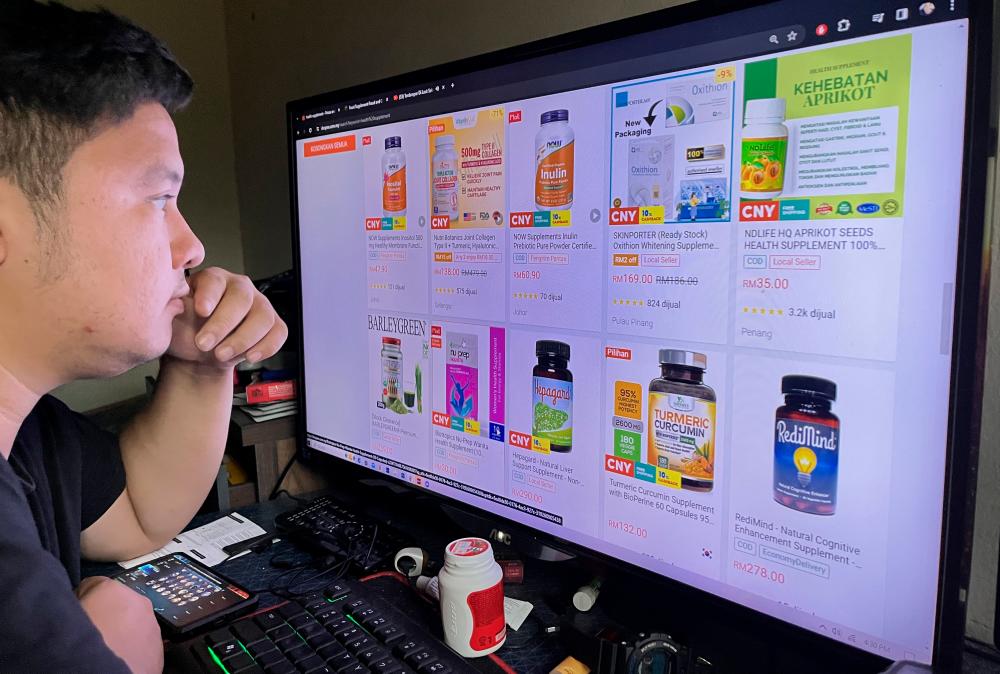PETALING JAYA: While purchasing supplements online is convenient, Universiti Kebangsaan Malaysia public health medicine specialist Prof Dr Sharifa Ezat Wan Puteh warned consumers that it is risky to buy them without the guidance of a pharmacist.
She said pharmacies, health stores and vending machine operators are now offering an extensive range of dietary supplements, from vitamins and minerals to herbal extracts and protein powders.
“Probiotics and prebiotics, for instance, have become popular as Malaysians are now more conscious of their gut health and digestive well-being.
“The demand for plant-based supplements is also rising since Malaysians are now increasingly leaning towards vegan and vegetarian options.”
However, Sharifa said poor oversight and knowledge about individual health conditions can lead to unintended consequences when consumers make uninformed decisions.
According to Health Ministry statistics, almost 9,000 new kidney failure patients are registered annually, and they require dialysis treatment.
The prevalence of chronic kidney disease in Malaysia has been on the rise, it said, adding that the consumption of unregistered health supplements was among the factors contributing to kidney disease.
“From January 2018 until December 2022, the National Pharmaceutical Regulatory Agency received 67 reports of adverse events associated with renal functions suspected to be due to the consumption of health supplements.
“Of these, 14 were suspected to be due to the use of unregistered health supplements.”
Sharifa said in recent years, the health and wellness industry has boomed due mainly to the popularity of dietary supplements, with many individuals opting to purchase such products independently.
Malaysian Coalition on Ageing chairman Cheah Tuck Wing said the elderly are now squandering their money on unnecessary supplements and falling prey to the marketing and promotional tactics of independent sellers.
“These supplements can sometimes be harmful. Unless the senior citizens have specific vitamin deficiencies, maintaining a balanced diet with ample greens, fruits and protein should be enough,” he said.
Cheah emphasised that it is advisable to consult professionals such as dieticians, medical doctors and pharmacists to determine the necessity for supplements, rather than making decisions influenced by advertisements, social media or peer recommendations.
Sharifa said while supplements can offer health benefits, they should not be taken randomly.
“When it comes to the elderly, interactions with prescription medications, allergies and underlying health conditions must be carefully considered.
“Some pills can irritate the oesophagus, causing discomfort or choking, while some ‘natural’ products may contain synthetic ingredients.”
She said without the expertise of a pharmacist, individuals may inadvertently combine supplements that could negatively impact their health.
“Certain vitamins or minerals can interfere with the absorption or effectiveness of prescription medications, leading to diminished therapeutic effects or even harmful side effects,” she warned.
Sharifa also said purchasing supplements from unverified sources or obscure online platforms can expose consumers to the risk of counterfeit or contaminated products.
“The absence of a pharmacist’s guidance may cause individuals to purchase products that do not meet regulatory standards. This can cause harm instead of providing the intended health benefits.”
She said the supplement industry is saturated with products claiming to offer ‘miraculous’ health benefits, and consumers may find themselves spending significant amounts of money on products that may not be necessary or suitable for their needs.
She advised consumers to prioritise their well-being by consulting healthcare professionals before incorporating supplements into their daily routines.
“The collaboration between consumers and pharmacists is crucial in promoting safe and effective supplement usage in the pursuit of better health.”









